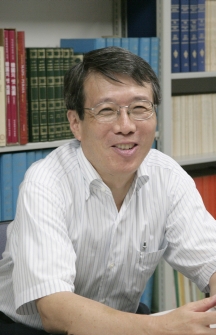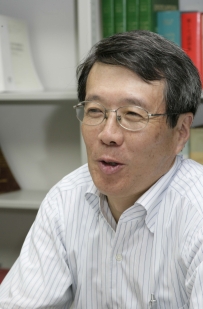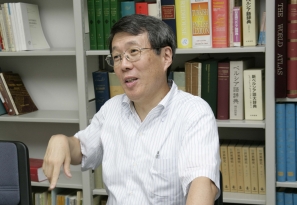Faculty Interview 01
Haneda Masashi (Director & Professor)

―― What are some of your present research interests?
There are a few topics that I am working on; the easiest to explain would be “writing new history of the world.” The world history class taught at high schools—we could call it Japan’s official version of world history. Even those who have not taken world history classes in high school have some knowledge of world history that is close to this official view. This image is true not only in Japan, but is, to a large extent, shared by people around the world. However, I feel that it is no longer suitable to the present age, and that it must be redone.
―― Does that mean that you will not only look at the history of Islam, which is your specialty, but the whole of world history?
Yes. Up to a certain point, I have been claiming my specialty to be the history of the Islamic world, but I stopped doing that. Let me explain why. When I tell someone I’ve met for the first time that my specialty is world history, most likely the person will ask “which part of world history?” The assumption behind this question is that the world is divided into several parts, and that each part has its own history. However, such perception of history could be a bone of contention and disputes from time to time, as could be seen in the controversy on the understanding of history in Japan, China, and Korea.
I recently began to wonder whether history that triggers conflict is truly necessary or not. It was necessary in the past. The academic discipline of historical studies was established in the nineteenth century, a period that can be characterized by the rise of nationalism. In order to create a nation and its people, it was necessary that the people have history that was common to all. Common history has the effect of strengthening the unity of the people and their feeling of fellowship. However today, such history only functions to fix one’s view of the world, as “Japan and China are different” or “Islam and Europe are different.” I think that it is necessary to write history that is more suitable to this age.
In simple terms, what we need is “world” history. Up to today, we have written history to assert our own uniquenesses and thereby, highlight the differences from other countries. For instance, we would say, “France and Germany are different; Japan and China are different.” During that process, common elements within the boundaries of Japan and France may be found, and could be emphasized. Today, we must search for the commonality throughout the “world,” and write a history that can make us realize that the world is one.
―― Does that mean that you are removing politics from history?
It is certainly not possible to eliminate politics from history. Rather, this is a very political undertaking. In reality, countries do exist, and in a certain sense it is natural that each country has its own history, just as each individual has his or her own history.
However, that is not enough. In the present age, people around the world should also have “world history” that they can claim to be theirs. We as historians have contributed to the building of the old framework of “nation and its people.” Now it is time for us to take the lead to create a new framework of world history to find a new direction for the people of the world.

―― Do you have any specific methods in mind to achieve this?
At this point, I can think of two methods. The first is the approach from the perspective of environment to write history through examining how people have lived in an environment as they connected with the environment. Therein, whether the person is German or French does not matter much. The subject of this history is people and their surrounding environment. However, to write such a history, achievements and methods of historical studies used in the past are not very useful. Since it is important to know about temperature and vegetation, it is necessary to make use of research done in the field of natural sciences. For a historian, this is a start from zero.
The other is to make use of research in historical studies as much as possible and reinterpret history to form a new conception of world history. For instance, Japanese history has been grasped as a single tube, in which a chain of various events is placed. We could expand that tube a little more and create another tube that contains China and the Korean peninsula as well. Having done that, we can probably come up with a different explanation or understanding of historical facts from that that could be interpreted within a single tube containing the history of Japan. I am thinking that we could keep expanding the tube until eventually we reach a point where we can imagine the world to be one tube.
―― You have been studying the history of Iran. What prompted you to shift your focus to the world?
One is the academic environment at the Institute for Advanced Studies on Asia. I had initially specialized in the history of Islam and Iran. However, since the Institute consists of scholars from many different fields, not everybody thinks that my research is interesting. Even though one may be highly respected in the field of history, once you step out of the field, its methodology and meanings could be questioned. So it all began with my wish to have the meaning of my research be appreciated by my colleagues at the Institute. The heterogenic environment at the University of Tokyo was also important. It is fairly difficult to talk to a professor from the natural sciences and have him/her acknowledge the meaning of historical studies. As I dug deeper into the question of why I am doing such a research, I reached a point where I was asking the meaning of historical studies.
Another turning point was the 9.11 Incident. After that incident, Islam and the Muslims were given a severe thrashing. When I asked myself why that happened, I realized that the problem lay in the concept of the “Islamic world” itself. Through some research, I learned that the concept was created in the nineteenth century by “modern Europe.” This was the time when the worldview that placed Europe and Islam in opposition to each other had gained much influence, and the basis of our present understanding of the world was formed by studies and views that branched out from such a worldview. I began to think that the source of the problem was the way of thinking in which we make distinctions between self and other, which perceived the Islamic world as “another world out there, different from ours.” This was the starting point of my plan for the new world history.

―― I am already excited just from hearing about your vast project of reconstructing the worldview created in the modern period and history that is based on such.
Normally, a discreet scholar would not claim to achieve such a goal so shamelessly. It may be an interesting story, but I do not yet know whether it could actually be realized…. Nobody likes to be criticized. It hurts and you don’t feel good either. When I was young, I hid behind my teachers and seniors, or formed a scrum with my colleagues so that I would not get hit by a bullet. However, I learned that once I am determined and stand in the forefront, the bullet does not hit me so easily, and even if it did, it doesn’t hurt much. I have finally found something meaningful and am seriously engaged in it; whoever wants to shoot can shoot! I may quit after I get hit by 100 bullets (laugh). As of now, I have announced that I will write a new history of the world in five years, so please look forward to it.

